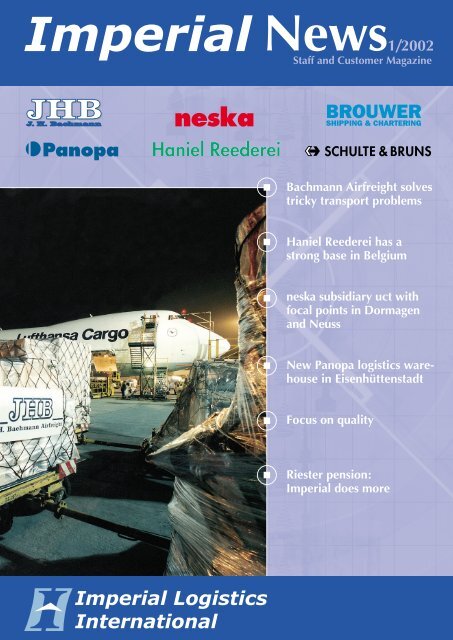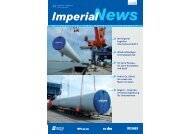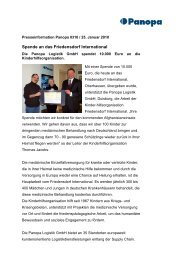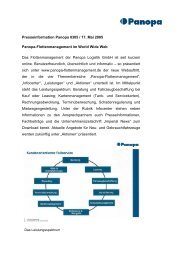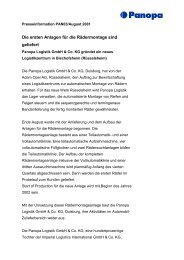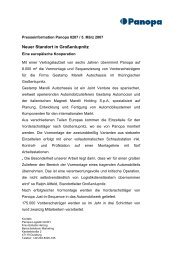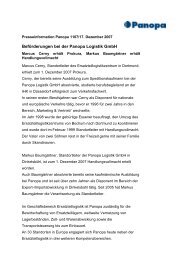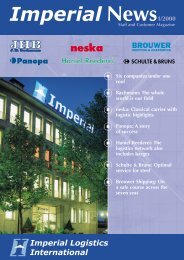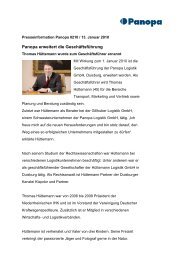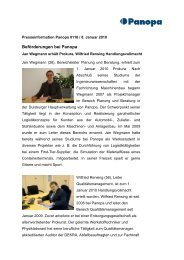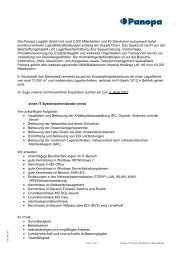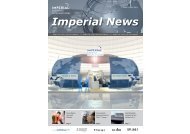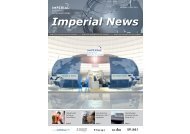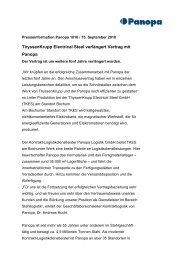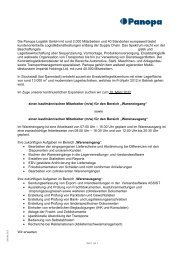Bachmann Airfreight Solves Tricky Transport Problems ... - Panopa
Bachmann Airfreight Solves Tricky Transport Problems ... - Panopa
Bachmann Airfreight Solves Tricky Transport Problems ... - Panopa
You also want an ePaper? Increase the reach of your titles
YUMPU automatically turns print PDFs into web optimized ePapers that Google loves.
News1/2002<br />
Staff and Customer Magazine<br />
<strong>Bachmann</strong> <strong>Airfreight</strong> solves<br />
tricky transport problems<br />
Haniel Reederei has a<br />
strong base in Belgium<br />
neska subsidiary uct with<br />
focal points in Dormagen<br />
and Neuss<br />
New <strong>Panopa</strong> logistics warehouse<br />
in Eisenhüttenstadt<br />
Focus on quality<br />
Riester pension:<br />
Imperial does more
2 � IMPERIAL NEWS<br />
Editorial<br />
Dear Employees, Dear Customers,<br />
Severe economic turbulence in Argentina, which has had a<br />
strong impact on the neighbouring countries, a recession in<br />
Japan and in the European Union countries, of which Germany<br />
has been hit the hardest, and the impacts of the terrorist<br />
attack on 11 September 2001 as well as the terrorist threat<br />
and the unstable political situation in the Middle East, particularly<br />
in Israel – these are the daily headlines that pursue us<br />
in this business year. Especially in Germany the economy is<br />
suffering from a significant setback in the steel industry, substantial<br />
declines in automobile production and the very restrained<br />
mood in the chemical industry besides the disastrous<br />
situation in the construction sector.<br />
All of this, Ladies and Gentlemen, sounds neither motivating<br />
nor positive, and the impression of the consumer that the<br />
change in currency has been accompanied by a considerable<br />
rise in prices will undoubtedly not result in a brightening of<br />
the economic picture.<br />
In the face of all these negative events, it is a reassuring sign<br />
that most of the targets set by our corporate group will be<br />
achieved in this business year. This includes in particular<br />
Brouwer Shipping & Chartering, Haniel Reederei and neska,<br />
which have maintained a stable course. <strong>Panopa</strong> is moving into<br />
future growth fields with excellent performance, though the<br />
situation in the automobile industry has put a damper on the<br />
economy. J.H. <strong>Bachmann</strong> has developed positively in all areas<br />
after various restructuring measures, with the exception of the<br />
USA (11 September 2001), Brazil (because of Argentina) and<br />
South Africa (merger with Megafreight).<br />
The predominant achievement of the set targets in the current<br />
business year characterises the stability of the group. After the<br />
consolidation with Haniel Reederei the Imperial Logistics International<br />
Group rests on a solid foundation for the planned<br />
further developments.<br />
A pathbreaking example is the automatic tyre assembly unit<br />
Changes will take place<br />
in the near future in the<br />
management of the<br />
largest West European inland<br />
shipping company, the<br />
Haniel Reederei Group<br />
based in Duisburg.<br />
The spokesman of the<br />
Board of Management of<br />
Haniel Reederei Holding<br />
GmH and at the same time<br />
member of the Board<br />
of Management of Imperial<br />
Logistics International<br />
GmbH & Co. KG, Duisburg,<br />
Friedhelm Askerlund<br />
(63), will retire for health<br />
reasons on 30th June 2002<br />
after over 46 years of successful<br />
work. Friedhelm<br />
Askerlund played a decisive<br />
role in shaping the group<br />
and achieving its present<br />
success. He will remain at<br />
the disposal of the Haniel<br />
just put into operation for<br />
Opel Rüsselsheim with pioneering<br />
technology.<br />
Effective as of July 2002,<br />
<strong>Panopa</strong> Logistik in South<br />
Africa with its special orientation<br />
to the core sectors will be able to offer its know-how<br />
in supply chain management, line feeding and spare parts logistics<br />
particularly to the automobile, steel and chemical industry<br />
there.<br />
All planning and current talks on the relevant markets are<br />
geared to consistently expanding our strategic objectives of<br />
internationalisation and holistic logistics services and thus attaining<br />
worldwide sales of 2.5 thousand million Euro within a<br />
few years.<br />
The performance of the Imperial Holdings Group is excellent<br />
again after publication of the six-month results. Particular<br />
emphasis must be placed on the sectors of tourism, aviation<br />
and especially the transport and logistics division, with whom<br />
we will form a united front for joint strength in South Africa in<br />
future.<br />
I Yours,<br />
Gerhard Riemann<br />
Executive Director of Imperial Holdings Ltd.,<br />
Edenvale and Chief Executive Officer of<br />
Imperial Logistics International<br />
Change in Shipping Company leadership<br />
Friedhelm Askerlund Helmut Botermann<br />
Reederei Group on a consulting<br />
basis on the Advisory<br />
Board.<br />
His successor and<br />
spokesman of the Board of<br />
Management will be Helmut<br />
Botermann (49), who<br />
has already successfully influenced<br />
the course of the<br />
group for eight years. At<br />
the same time he will be<br />
appointed to the Board of<br />
Management of Imperial<br />
Logistics International effective<br />
as of 1st July 2002.<br />
Karl-Heinz Bellmer (57)<br />
will strengthen the management<br />
of Haniel Reederei<br />
Holding also effective on<br />
1st July 2002. Mr. Bellmer<br />
will remain Managing<br />
Director of the NiedersächsischenVerfrachtungsgesellschaft<br />
mbH in Hannover.<br />
●
Cover photograph:<br />
There is little time to<br />
load and unload aircraft,<br />
so the cargo is stowed<br />
beforehand on special<br />
aircraft pallets or in<br />
containers.<br />
4 Specialist in thin air<br />
5 Logistics in Australia<br />
6 With De Grave Antverpia Haniel Reederei has a strong base in Belgium<br />
8 Logistics specialities for large customers<br />
10 EKO Stahl buys professionality at <strong>Panopa</strong><br />
11 Volkswagen can rely on <strong>Panopa</strong> in Posnań, too<br />
12 On the road in South Africa with nearly five thousand vehicles<br />
14 Focus on quality<br />
15 Riester pension: Imperial does more<br />
Edited by: Imperial Logistics International GmbH & Co. KG, Duisburg<br />
Kasteelstraße 2 • D-47119 Duisburg<br />
Telephone: +49 (0) 203-8 00 52 30 • Telefax +49(0) 203-80 05-2 84<br />
e-mail: imperial@imperial-international.com<br />
Table of Contents<br />
J. H. <strong>Bachmann</strong><br />
Haniel Reederei<br />
IMPERIAL NEWS � 3<br />
neska<br />
<strong>Panopa</strong><br />
Imperial
<strong>Bachmann</strong> <strong>Airfreight</strong> solves tricky transport problems<br />
Specialist in thin air<br />
“What is particularly exciting about our work is the fact that the<br />
whole world lands on our desk. In the morning we process inquiries<br />
from Asia, at midday from Europe and in the evening from the USA<br />
and South America.” In the estimation of Managing Director Bernd<br />
Oberfeld globalisation has long become part of daily life for the<br />
staff at J.H. <strong>Bachmann</strong> GmbH <strong>Airfreight</strong> Division with branches<br />
at Germany’s major transport airports.<br />
The <strong>Airfreight</strong> Division<br />
of J.H. <strong>Bachmann</strong><br />
GmbH, a subsidiary of<br />
Imperial Logistics International<br />
GmbH & Co. KG<br />
with headquarters in Duisburg,<br />
earned around 40 million<br />
Euro in Germany alone<br />
with 85 air freight staff<br />
members in 2001. Goods<br />
having a total weight of<br />
18,000 tonnes and spread<br />
among 70,000 orders were<br />
transported during this period.<br />
As one can see, the transport<br />
volume is limited. The<br />
annual turnover of the entire<br />
Frankfurt Airport does not<br />
exceed 1.5 million tonnes.<br />
As a comparison, a Haniel<br />
Reederei multiple barge<br />
convoy alone handles<br />
around 10,000 tonnes, for<br />
the most part bulk cargo.<br />
However, aircraft do not<br />
transport bulk cargo, unless<br />
it is urgent.<br />
Bernd Oberfeld: “Air<br />
freight is always in a hurry.<br />
4 � IMPERIAL NEWS<br />
If not, then it is extremely<br />
urgent. After all, if an assembly<br />
line in an automobile<br />
plant stops because supplied<br />
parts are missing, for<br />
example, this may cost up to<br />
100,000 dollars an hour.<br />
And that is where we air<br />
freight forwarders come in.”<br />
<strong>Bachmann</strong>, established in<br />
1775, has been operating in<br />
the air freight business for<br />
over 50 years. In 1948<br />
<strong>Bachmann</strong> was among the<br />
first companies to sign the<br />
IATA agency agreement,<br />
which guarantees uniform<br />
standards worldwide. Bernd<br />
Oberfeld: “As a rule, J.H.<br />
<strong>Bachmann</strong> handles virtually<br />
all types of goods, from textiles<br />
and automobile and<br />
machine parts to chemicals<br />
and food.”<br />
Air freight shipments are<br />
sent on nearly all scheduled<br />
flights and, of course, on<br />
purely cargo aircraft.<br />
Whereas only the lower<br />
deck is available for freight<br />
J.H. <strong>Bachmann</strong>’s <strong>Airfreight</strong> Division works together with<br />
selected airlines.To be able to meet all requirements of its<br />
customers, fixed freight space allotments are booked in<br />
advance.<br />
on passenger aircraft, the<br />
main deck is also loaded on<br />
cargo aircraft.<br />
There is little time to load<br />
and unload aircraft. Therefore,<br />
the freight is first<br />
stowed on special aircraft<br />
pallets or containers. Socalled<br />
“rolling beds” in the<br />
aircraft and on the ground<br />
permit speedy and laboursaving<br />
handling of the pallets.<br />
J.H. <strong>Bachmann</strong> GmbH<br />
“consolidates”, i.e. bundles,<br />
the air freight shipments for<br />
selected destinations daily at<br />
the warehouse in Kelsterbach<br />
near Frankfurt am<br />
Main. Specially trained employees<br />
prepare the aircraft<br />
pallets, which are subsequently<br />
delivered to the airline<br />
commissioned in each<br />
case.<br />
The central handling department<br />
responsible for<br />
this, “Consolidation”, not<br />
only has to comply with<br />
deadlines and flight schedules,<br />
but must also pay particular<br />
attention to the type<br />
of goods transported. Not<br />
everything can go on the<br />
same pallet. Varying customs<br />
regulations and the<br />
commitment undertaken<br />
within the framework of<br />
ISO certification, such as<br />
not transporting laboratory<br />
animals or weapons, round<br />
off the list of criteria.<br />
<strong>Bachmann</strong> does not have<br />
any aircraft of its own, but<br />
cooperates as an agent with<br />
selected airlines, depending<br />
on the flight route, at which<br />
IMP 3<br />
The opening front section of the Jum<br />
load large pieces of freight and has th<br />
tial for <strong>Bachmann</strong>’s worldwide air freig<br />
Consolidation has fixed<br />
freight space allotments on a<br />
monthly basis.<br />
In markets characterised,<br />
in part, by cutthroat competition<br />
<strong>Bachmann</strong>’s logistics<br />
experts profit from their<br />
specific know-how concerning<br />
special shipments. At<br />
the beginning of the year,<br />
for example, they transported<br />
a turbine shaft for a<br />
power station weighing 75<br />
tonnes from Hattingen to<br />
Madras in India. The specialists<br />
at J.H. <strong>Bachmann</strong>’s<br />
<strong>Airfreight</strong> Division not only<br />
chartered a whole aircraft<br />
for this shipment, but also<br />
built a loading frame to stabilise<br />
the shaft in the aircraft.<br />
Günther Weichwald,<br />
Branch Manager, and Hans-<br />
Peter am Weg, Project Man-
o makes it possible to load and unus<br />
opened up further market potenht<br />
operations.<br />
ager of J.H. <strong>Bachmann</strong><br />
GmbH in Kelsterbach near<br />
Frankfurt, are particularly<br />
proud of a very different<br />
type of “cargo”. Vaccines,<br />
day-old chicks and brooding<br />
eggs number among the<br />
most perishable and sensitive<br />
transport goods in general.<br />
For such shipments<br />
<strong>Bachmann</strong> guarantees maximum<br />
punctuality and the<br />
necessary temperature and<br />
air conditioning control.<br />
This ensures that the customer,<br />
such as the World<br />
Health Organisation, not<br />
only receives the urgently<br />
required serum punctually,<br />
but also in usable condition.<br />
Hans-Peter am Weg: “It<br />
would be very difficult for<br />
anyone to match us in that<br />
department.” ●<br />
Logistics in Australia<br />
BACHMANN<br />
<strong>Bachmann</strong> means reliability<br />
Australia is a major focus of J.H. <strong>Bachmann</strong>. Particularly the<br />
distances to other continents and the special features of the<br />
Australian import and export regulations require competent logistic<br />
support for those <strong>Bachmann</strong> customers in Europe, Asia and North<br />
America who export goods towards Australia or import goods from<br />
the continent down under.<br />
<strong>Bachmann</strong> is represented<br />
with branches in Australia’s<br />
major centres,<br />
Melbourne and Sydney. At<br />
these locations international<br />
airports as well as the key<br />
container and cargo handling<br />
port terminals. Both<br />
office locations are thus in a<br />
favourable position to meet<br />
the requirements of international<br />
clients both quickly<br />
and reliably.<br />
J.H. <strong>Bachmann</strong>’s clientele<br />
in Australia includes the<br />
names of numerous wellknown<br />
industrial and commercial<br />
enterprises. They<br />
have all convinced themselves<br />
of the service quality<br />
of the <strong>Bachmann</strong> organisation<br />
in the course of the last<br />
20 years. This is underlined<br />
by the many long-standing<br />
business relations.<br />
The freight forwarding<br />
and logistics business started<br />
in a close partnership with<br />
an Australian company, CGF<br />
Container and General Forwarding.<br />
That was in 1982.<br />
The management there has<br />
remained unchanged since<br />
then. Gerhard Rathmanner<br />
and Don Creighton manage<br />
<strong>Bachmann</strong>’s activities in<br />
Australia.<br />
As at many other locations<br />
all over the globe,<br />
<strong>Bachmann</strong> is an all-round<br />
logistics provider in Australia.<br />
The spectrum ranges<br />
from clearance and supply<br />
chain management for air<br />
and sea freight shipments of<br />
all kinds to carrying out extensive<br />
equipment and project<br />
shipments from the con-<br />
signor’s plant to the final<br />
construction site.<br />
The core activities include<br />
automobile logistics,<br />
i.e. supplying the assembly<br />
plants with car production<br />
parts according to the pre-<br />
cise specifications of the<br />
suppliers and consignees.<br />
The fine coordination involved<br />
here is based on an<br />
exclusively developed IT<br />
system, called <strong>Bachmann</strong><br />
Global Connect (BGC). It is<br />
accessible via the Internet<br />
and can be used for communication<br />
and control by all<br />
those involved in the<br />
process work flows. The<br />
door-to-door services can be<br />
carried out very precisely,<br />
very rapidly and very reliably<br />
on this basis.<br />
<strong>Bachmann</strong> organises in<br />
this sector as well as for<br />
other incoming and outgoing<br />
cargo flow the entire<br />
transport chain. This is what<br />
the customers actually want.<br />
They find the right contact<br />
persons for this requirement<br />
among the competent members<br />
of <strong>Bachmann</strong>’s staff.<br />
Right from the beginning<br />
<strong>Bachmann</strong> is represented at two locations in Australia.<br />
Here the Sydney team presents itself on the occasion of<br />
the visit of Gerhard Riemann and Carl Salfeld.<br />
<strong>Bachmann</strong> Australia has<br />
been equipped with everything<br />
it needs for the smooth<br />
operation of a customs<br />
agency, either to bring the<br />
goods, which are usually<br />
stowed in containers, into<br />
the country after customs<br />
clearance or prepare them<br />
for export. “The staff at both<br />
locations handles the diverse<br />
tasks competently,” report<br />
Gerhard Riemann and <strong>Bachmann</strong><br />
Managing Director<br />
Carl Salfeld after their last<br />
visit to Australia a few<br />
weeks ago. ●<br />
IMPERIAL NEWS � 5
With De Grave-Antverpia Haniel Reederei has a strong base in Belgium<br />
Solid growth is contin<br />
Nailing its colours to the mast in Belgium is<br />
a matter of course for a leading inland shipping<br />
enterprise in Western Europe, such as<br />
Haniel Reederei Holding, which belongs to<br />
the Imperial Group. This commitment was<br />
underlined through the takeover of De Grave<br />
in Belgium in 1992.<br />
Belgium and in particular<br />
the Flemish government<br />
have recognised<br />
the economic benefits and<br />
ecological advantages of inland<br />
shipping and acted accordingly.<br />
“This also has a<br />
positive influence on our<br />
business,” reports De Grave-<br />
Antverpia Managing Director<br />
Louis Van Ballaer.<br />
As a seaport company,<br />
De Grave-Antverpia is<br />
primarily the “big base” for<br />
the Haniel Reederei Group<br />
in the port of Antwerp as<br />
well as in the entire Belgian<br />
inland shipping market. Besides<br />
the headquarters in<br />
Antwerp, the chartering<br />
business is also carried out<br />
at the branches in Gent and<br />
Liège. In plain language<br />
chartering means: bringing<br />
together the demand for inland<br />
shipping transport services<br />
on the part of industrial<br />
and commercial enterprises<br />
and the supply of freight<br />
space offered by barge owners<br />
and other shipowners according<br />
to the needs of the<br />
customers on a commercial<br />
basis. “In-depth market<br />
know-how and first-class<br />
contacts to both sides are required<br />
to achieve satisfactory<br />
transport transactions for<br />
all those involved,” emphasises<br />
Louis Van Ballaer. The<br />
company and its staff – some<br />
of whom can look back on a<br />
long professional career in<br />
this branch of industry –<br />
have gained this specific<br />
sectoral know-how in the<br />
course of six decades.<br />
6 � IMPERIAL NEWS<br />
Haniel Reederei already<br />
expanded its activities in<br />
the seaport of Antwerp<br />
through the establishment<br />
of the independent company<br />
Haniel Shipping,<br />
Antwerp in spring 1990. It<br />
took a large step forward by<br />
acquiring De Grave, a family<br />
enterprise with a long<br />
tradition, in 1992. De<br />
Grave’s inland shipping activities<br />
began very modest<br />
at the end of the 1930s with<br />
the urge of company<br />
founder Guillaume De<br />
Grave to become self-employed.<br />
During the initial<br />
phase, which was difficult<br />
due to the war, the company<br />
founder managed to organise<br />
regular shipments of<br />
white sand for the glass industry<br />
and coal shipments<br />
from German mines to Belgium<br />
surprisingly quickly<br />
and competently from<br />
today’s perspective<br />
Extensive vertical range<br />
of services<br />
The following decades<br />
were characterised by vigorous<br />
growth, both with respect<br />
to volume and sales<br />
and in terms of the range of<br />
services. The De Grave<br />
team not only purchased<br />
the desired shipping transport<br />
space, but also organised<br />
the cargo handling,<br />
took care of preliminary<br />
and subsequent transport<br />
whenever the receiving<br />
sites were not located on<br />
the water, booked capacity<br />
De Grave-Antverpia has its corporate headquarters at the Euro Cent<br />
for maritime shipments on<br />
behalf of its customers,<br />
provided for customs clearance<br />
and handled the extensive<br />
documentation for all<br />
the necessary services.<br />
“The broad range of services<br />
connected with inland<br />
shipping transport is still<br />
the focus of our business<br />
today,” remarks Louis Van<br />
Ballaer.<br />
Since 1997 the company<br />
name has had the addition<br />
“Antverpia”. “In that year<br />
De Grave merged with<br />
Stinnes-Antverpia, also a<br />
chartering enterprise, but<br />
with a different customer<br />
structure in Belgium, so<br />
there was hardly any overlapping,”<br />
notes Managing<br />
Director Rudy Ceusters.<br />
“Since then we have not<br />
only had the double name,<br />
but also two flags.”<br />
Van Ballaer also points<br />
out the takeover of Sanara,<br />
a Belgian company, nine<br />
years ago. All of this is an<br />
expression of a business<br />
strategy aimed at further<br />
expanding the already significant<br />
market position in<br />
Belgium, he adds. This also<br />
applies to the present. Only<br />
recently a chartering enterprise<br />
operating in the inland<br />
shipping sector was acquired,<br />
providing for an additional<br />
annual volume of<br />
around one million tonnes.<br />
Chartering has a long<br />
tradition in Belgium. There<br />
has never been a situation<br />
in Belgium in which the<br />
market was dominated by<br />
large shipping companies.<br />
The market has been characterised<br />
by barge owners<br />
who owned only one ship<br />
or perhaps two in some<br />
cases.<br />
These owner-operated<br />
shippers were dependent on<br />
the services and cargo acquisition<br />
of charterers.<br />
“This applies today to an
ued<br />
er, in the middle of Antwerp’s port area.<br />
even greater extent after<br />
many shipping companies<br />
in western Europe have reduced<br />
their fleets by selling<br />
or renting out barges,” reports<br />
van Ballaer.<br />
In Belgium inland shipping<br />
is supported by a<br />
transport policy that enhances<br />
its future opportunities.<br />
Van Ballaer points out<br />
the good structural condition<br />
of the major inland waterways.<br />
Brussels and Gent<br />
can even be reached by<br />
seagoing ships and between<br />
Antwerp and Liège it is additionally<br />
possible to deploy<br />
fully loaded multiple<br />
barge convoys on the 3.40<br />
metre deep Albert Canal.<br />
Furthermore, the cost pressure<br />
has been relieved.<br />
The most important<br />
measure in this connection<br />
was the reduction of the<br />
canal charges by a full 90<br />
percent to the present level<br />
of 0.025 cents per 100 kilo-<br />
metre-tonne. Those who are<br />
familiar with the level of<br />
canal charges in various<br />
parts of Europe can appreciate<br />
the full impact of this<br />
step on the part of the Belgian<br />
government.<br />
State strengthens shipping<br />
In addition, one should<br />
not underestimate state support<br />
of investments in the<br />
infrastructure and suprastructure<br />
of the inland shipping<br />
sector, reports van<br />
Ballaer. When a company<br />
in Belgium builds a waterfront<br />
facility to enable<br />
cargo transhipment to or<br />
from barges, 80 percent of<br />
these investments are subsidised<br />
through public<br />
funds. To van Ballaer’s<br />
knowledge, this has induced<br />
a number of companies<br />
to incorporate inland<br />
shipping into their transport<br />
planning in connection with<br />
shipping and receiving<br />
goods to a greater degree<br />
than previously. Despite a<br />
weakened economy, there<br />
have been no cutbacks in<br />
volume in Belgium inland<br />
shipping until today. Van<br />
Ballaer attributes the continuing<br />
good level of activity<br />
in the Belgian inland<br />
shipping sector to this supporting<br />
transport policy,<br />
among other things.<br />
According to van Ballaer,<br />
a decisive factor for the success<br />
of De Grave-Antverpia<br />
is, of course, its own performance,<br />
which has to be<br />
demonstrated under competitive<br />
conditions day in and<br />
day out. The committed and<br />
well trained employees ensure<br />
a smooth interaction of<br />
all business partners coming<br />
together in this market. This<br />
begins right from the communicative<br />
level. Most of<br />
the members of the De<br />
Grave-Antverpia staff speak<br />
very free and easy in four<br />
languages: Flemish, French,<br />
English and German. This<br />
breaks down barriers in this<br />
international field of business.<br />
Electronic networking<br />
between all people involved<br />
in the business work flows<br />
has been completed and is<br />
accepted and mastered as a<br />
matter of course. “If we<br />
continued to work conventionally<br />
in the offices as before,<br />
we would have to employ<br />
25 percent more staff<br />
members to handle the current<br />
volume. Thus, we have<br />
grown without having to increase<br />
the number of employees,”<br />
notes Ceusters.<br />
Moreover, there are no<br />
longer any alternatives to<br />
Internet and email if one<br />
wishes to maintain contact<br />
to customers, port operating<br />
companies and authorities.<br />
The fact that the company<br />
conducts business from<br />
three locations in Belgium<br />
does not mean that activities<br />
are only carried out in<br />
HANIEL<br />
the domestic freight market.<br />
Two thirds of the transport<br />
operations organised<br />
by De Grave-Antverpia are<br />
international shipments<br />
with the Netherlands, Germany<br />
and France. Of particular<br />
importance here is<br />
the smooth interaction<br />
within the European network<br />
of the Haniel Reederei<br />
Group. The clientele is<br />
predominantly from the<br />
sectors of iron and steel,<br />
chemicals, energy, building<br />
materials and paper.<br />
The continuity of business<br />
also gives De Grave-<br />
Antverpia the opportunity<br />
to maintain a commitment<br />
with 150 ships through permanent<br />
employment. This<br />
available capacity is broadly<br />
diversified: from Flemish<br />
canal ships carrying<br />
only 300 tonnes to Rhine<br />
ships with a capacity of<br />
over 3000 tonnes as well as<br />
around 40 push barges and<br />
eight pusher-tugs with<br />
strong engines. “This<br />
makes us a genuine shipping<br />
company that takes<br />
care of everything so the<br />
fleet remains in constant<br />
use and can continue to<br />
grow.” Additional potential<br />
is created through good<br />
quality. Furthermore, the<br />
inland shipping sector benefits<br />
from the fact that,<br />
given the present state of<br />
the road and rail networks,<br />
these two means of transport<br />
are reaching their capacity<br />
limits and the consequence<br />
is longer transport<br />
times and more delays than<br />
before.<br />
“De Grave-Antverpia is<br />
competent enough to cover<br />
all services connected with<br />
inland shipping transport.<br />
This means further growth<br />
can be generated,” van Ballaer<br />
is confident. He and<br />
his team optimistically look<br />
forward to the coming<br />
years. ●<br />
IMPERIAL NEWS � 7
neska subsidiary uct with focal points in Dormagen and Neuss<br />
Logistics specialities for larg<br />
“Every year has meant considerable headway for us,” report uct Managing<br />
Director Peter Linden and uct Branch Manager Rolf Koenekamp<br />
in Dormagen. At uct, a subsidiary of neska, the “mix” is right:<br />
motivated staff, modern operating equipment, two outstanding locations<br />
on the Rhine and a clientele that appreciates the services provided<br />
by this port freight forwarding company.<br />
The port business of uct<br />
(the three letters are the<br />
abbreviation for Umschlag<br />
Container Terminal<br />
GmbH) is concentrated at<br />
the locations in Dormagen<br />
directly on the Rhine between<br />
Cologne and Düsseldorf<br />
as well as in Neusser<br />
Hafen opposite Düsseldorf.<br />
The focus of these two<br />
neska enterprises is primarily<br />
placed on supplying the<br />
aluminium industry with<br />
raw materials. In addition,<br />
the services offered include<br />
dispatch of finished aluminium<br />
products as well as<br />
temporary storage and shipment<br />
of stainless steel products<br />
from three plants in the<br />
region. Part of this cargo is<br />
also stowed in seaworthy<br />
condition in containers on<br />
the respective company<br />
8 � IMPERIAL NEWS<br />
grounds. Furthermore, other<br />
products such as paper are<br />
handled and logistic chains<br />
are organised for goods of<br />
all kinds.<br />
In particular the company’s<br />
own cargo handling facility<br />
near Dormagen at<br />
Rhine kilometre 726 is<br />
situated at a remarkably<br />
favourable location for shipping.<br />
Three vessels can be<br />
loaded and unloaded at the<br />
same time here at a dolphin<br />
pier with vertical sheet piling<br />
having a total length of<br />
approx. 500 metres and<br />
three cranes for grabbable<br />
and general cargo as well as<br />
containers. “Good utilisation<br />
is made of this capacity,”<br />
reports uct Managing<br />
Director Peter Linden and<br />
Branch Manager Rolf<br />
Koenekamp adds: “The ma-<br />
jority of the ships calling<br />
here are inland vessels from<br />
the seaports of Rotterdam<br />
and Antwerp that bring primary<br />
aluminium products<br />
for further processing as<br />
well as coastal motor vessels<br />
from Norway and England<br />
with a similar cargo<br />
structure. These aluminium<br />
products are nearly exclusively<br />
destined for Alu-<br />
Norf, which is located within<br />
sight and is a joint venture<br />
of Alcan and VAW<br />
(Vereinigte Aluminiumwerke),<br />
which operate the<br />
largest aluminium rolling<br />
mill in the world only 1.5<br />
kilometres away.”<br />
The aluminium blocks<br />
unloaded in Dormagen<br />
weigh up to 32 tonnes and<br />
are called bars. They are<br />
transferred directly from the<br />
Clean and dry transhipment of goods between ship, railway, truck and warehouse location<br />
is possible in all kinds of weather here on the uct grounds in Neusser Hafen.The<br />
gantry crane integrated into the building roof has a lifting capacity of 35 tonnes.<br />
ships to flat cars of the industrial<br />
railway and delivered<br />
to the plant in coordination<br />
with Alu-Norf justin-time.<br />
This private railway<br />
has a direct connection to<br />
the network of the Deutsche<br />
Bahn (German Railway) so<br />
uct also has access to the<br />
European rail network.<br />
In addition to transhipment<br />
of the voluminous and<br />
heavy aluminium bars, uct<br />
receives further raw aluminium<br />
in Dormagen via<br />
ship in the form of pig, Tbars<br />
and sows. These are<br />
technical designations for<br />
significantly lighter units<br />
that are smelted at the aluminium<br />
plant and further<br />
processed there. For these<br />
latter goods trucks are the<br />
transport link between the<br />
port on the river the nearby<br />
aluminium plant. It is not<br />
much different in Neuss.<br />
There trains of the Neuss<br />
municipal port railway or<br />
trucks run back and forth<br />
between uct and Alu-Norf.<br />
The demand for products<br />
made of aluminium is growing<br />
constantly, observe<br />
Peter Linden and Rolf<br />
Koenekamp. One only has<br />
to think of the advance of<br />
aluminium into automobile<br />
production. “Our job as a<br />
logistics company with our<br />
own equipment is to ensure<br />
that the rising supply needs<br />
are met and to deliver the<br />
goods to the recipients<br />
within the desired time windows,”<br />
explains Rolf<br />
Koenekamp. The port facilities<br />
in Dormagen and Neuss<br />
are optimally suited for this<br />
purpose because not only<br />
inland vessels, but also<br />
coasters can be received<br />
here and the further transport<br />
via rail and road is very<br />
short. “All of this is provid-
e customers<br />
At Rhine kilometre 726 near Dormagen the uct facilities directly on the river offer everything<br />
necessary to meet the highest demands of industrial customers<br />
ed at favourable costs and<br />
involves low time requirements,”<br />
note Linden and<br />
Koenekamp.<br />
It is also becoming more<br />
and more common to make<br />
use of recycled material in<br />
the aluminium industry, observes<br />
Koenekamp. In the<br />
sheds on the outdoor<br />
Stainless steel coils are<br />
packed and stowed in containers<br />
fit for sea transport<br />
here at uct.<br />
grounds in Dormgen increasingly<br />
large volumes of<br />
shredded aluminium are<br />
stored temporarily before<br />
being taken to England and<br />
Norway on coasters. Only<br />
in these two countries are<br />
there special furnaces that<br />
smelt, among other things,<br />
coated recycled material<br />
(cans, for example) into<br />
pure aluminium. “In this<br />
way we manage to achieve<br />
full capacity utilisation, particularly<br />
of the coasters, in<br />
both directions more and<br />
more frequently,” reports<br />
Koenekamp.<br />
uct’s core business in<br />
Dormagen also includes the<br />
receipt and temporary storage<br />
of petroleum coke (a<br />
residue from oil refining),<br />
out of which anodes are<br />
produced, as well as bauxite<br />
and coal and broken glass.<br />
With all these loose, dry<br />
goods the cargo volume<br />
handled by uct is increasing.<br />
Besides the increasing<br />
receiving business, dispatch<br />
does not come off badly either.<br />
Part of the sheet produced<br />
at Alu-Norf in vary-<br />
ing thicknesses goes to export<br />
in the form of coils and<br />
ship transport from Dormagen<br />
is again optimally suited<br />
for this for reasons of<br />
cost and reliability.<br />
Container handling at uct<br />
in Dormagen is also visible<br />
from afar. Vessels of the<br />
Lower Rhine shipping pool<br />
operated by Haniel Container<br />
Line, Haeger & Schmidt<br />
and Rhinecontainer call at<br />
the company several times a<br />
week as part of scheduled<br />
service. A special container<br />
gantry crane with a lifting<br />
capacity of 42 tonnes rapidly<br />
performs loading and unloading<br />
work. Heavy industrial<br />
transport vehicles, such<br />
as straddle carriers and<br />
reach stackers, bring the<br />
containers to the desired<br />
storage position. Trained<br />
uct employees also load and<br />
unload containers at the request<br />
of customers. Seaworthy<br />
packing and stowing of<br />
the products in the containers<br />
are the most important<br />
prerequisites for damagefree<br />
transport on water.<br />
Furthermore, the Canadian<br />
Pacific Group – to which<br />
neska<br />
sea-going vessel shipping<br />
companies, such as Conship,<br />
Lykes, Cast and others,<br />
belong – maintains a<br />
container depot on the uct<br />
grounds. These customers<br />
place empty containers here<br />
and request them as required.<br />
At harbour basin “52” in<br />
Neuss the focus is on the<br />
handling of stainless steel<br />
products from the Thyssen<br />
Krupp plants in Krefeld,<br />
Benrath and Dillenburg.<br />
Great care must be taken<br />
with these products. In<br />
Neuss uct has a shed with a<br />
roof that projects over the<br />
water and under which the<br />
ships can be loaded and unloaded<br />
(see photo). In this<br />
way moisture is kept away<br />
from the high-mirror-finished<br />
sheet. A large portion<br />
of these stainless steel products<br />
is also stowed in containers<br />
here at uct and then<br />
exported worldwide. However,<br />
large volumes of highquality<br />
chromium ores for<br />
alloys, pure aluminium bars<br />
from England and Norway<br />
as well as containerised<br />
general cargo loads are also<br />
received and transhipped.<br />
The two large sheds on<br />
the uct grounds in Neuss are<br />
equipped with integrated<br />
gantry cranes, which can lift<br />
up to 35 tonnes in one shed<br />
and up to ten tonnes in the<br />
other. With a direct railway<br />
connection up to the sheds<br />
and a direct road link uct<br />
has all options at its disposal<br />
on its grounds in Neuss<br />
for incoming and outgoing<br />
traffic. “This also includes<br />
combined freight transport,”<br />
reports Peter Linden. Thus,<br />
within sight of uct in Neuss<br />
there is also a terminal for<br />
this interplay between railway<br />
and road freight traffic.<br />
As a result, customers can<br />
be offered any form of<br />
freight transport. uct does<br />
everything the logistics<br />
market requires and is consequently<br />
faced with a rising<br />
demand. ●<br />
IMPERIAL NEWS � 9
New <strong>Panopa</strong> logistics warehouse in Eisenhüttenstadt<br />
EKO Stahl buys<br />
professionality<br />
“EKO produces top quality, <strong>Panopa</strong> offers top logistics service.” This<br />
was a point made by Gerhard Riemann, CEO of Imperial Logistics<br />
International GmbH & Co. KG , in his speech at the opening of the<br />
new <strong>Panopa</strong> steel logistics warehouse at the EKO location in Eisenhüttenstadt.And<br />
EKO Managing Director Eckhardt Hoppe assessed<br />
the cooperation that has existed for nearly ten years as follows: “It was<br />
the right decision at that time. EKO Stahl concentrates on production,<br />
technology and sales. <strong>Panopa</strong> assumes warehousing, freight forwarding<br />
and dispatch.”<br />
The event took place at<br />
the end of last year:<br />
<strong>Panopa</strong> supported the<br />
growth of EKO Stahl GmbH<br />
in Eisenhüttenstadt on the<br />
Oder, which belongs to the<br />
ARCELOR Group, by<br />
building a steel logistics<br />
10 � IMPERIAL NEWS<br />
ing Director Günter Dresselhaus<br />
presented the commitment<br />
and achievements of<br />
<strong>Panopa</strong> at the opening of the<br />
new steel logistics warehouse.<br />
In his speech he<br />
placed particular emphasis<br />
on the modern technical<br />
these cranes accelerates<br />
cargo handling and protects<br />
the material. Another remarkable<br />
feature is the installed<br />
gas bright radiator<br />
heating system, whose longwave<br />
radiation only heats<br />
the freight. If the material is<br />
This is the heavy cargo transporter developed and built on behalf of <strong>Panopa</strong> for in-company<br />
transport.<br />
warehouse after it became<br />
too cramped in the existing<br />
warehouses. After all, within<br />
six years the dispatch volume<br />
of cold-rolled, hot-dip<br />
galvanised and organically<br />
coated thin sheet rose to 1.5<br />
million tonnes in Eisenhüttenstadt<br />
– an increase of 50<br />
percent!<br />
In the presence of many<br />
prominent personalities<br />
from politics and industry in<br />
the region <strong>Panopa</strong> Manag-<br />
equipment in the approximately<br />
9000 square metre<br />
warehouse, in which, among<br />
other things, trucks as well<br />
as 22 four-axle railway cars<br />
can be loaded at the same<br />
time. Further highlights are<br />
the two 40-tonne gantry<br />
cranes, which can also be<br />
operated via remote control,<br />
as well as magnets that lift<br />
coils and other steel products<br />
having a maximum<br />
weight of 32 tonnes. Use of<br />
warmer than the ambient air,<br />
there is no condensation<br />
water and thus no formation<br />
of rust.<br />
Günter Dresselhaus is<br />
particularly proud of the<br />
heavy cargo transporter used<br />
here for the first time, which<br />
has a load capacity of 120<br />
tonnes and considerably reduces<br />
the forklift traffic on<br />
the grounds (photo). The list<br />
of such technical highlights<br />
that facilitate and enhance<br />
the efficiency of the work<br />
flows of the approx. 120<br />
<strong>Panopa</strong> staff members under<br />
the management of<br />
Siegfried Skorubski, head of<br />
the Eisenhüttenstadt location,<br />
could be continued<br />
even further.<br />
Eckhardt Hoppe expressed<br />
his appreciation of<br />
the holistically organised logistic<br />
work procedures. He<br />
said his company had<br />
bought professionality from<br />
this provider, had progressed<br />
faster than expected<br />
and was thus able to offer<br />
better service to steel customers.<br />
Today EKO Stahl<br />
together with <strong>Panopa</strong> sets<br />
standards in the competitive<br />
market. Particularly in peak<br />
periods, he added, the company<br />
stood out positively<br />
from the competition thanks<br />
to speedy grouping of the<br />
consignments, rapid preparation<br />
of the outgoing vehicles,<br />
correct papers, data<br />
and information for the customers.<br />
Use is also made of<br />
IT and bar codes, of course.<br />
<strong>Panopa</strong> processes the<br />
steel calls, places the transport<br />
orders and checks<br />
whether the coils are delivered<br />
to the customers on<br />
schedule, Hoppe describes<br />
<strong>Panopa</strong>’s activities. The logistics<br />
concept was also refined<br />
and improved at the<br />
same time as the commencement<br />
of operation of<br />
the new warehouse. Services<br />
for the international<br />
steel trade, such as handling<br />
customs requirements,<br />
round off <strong>Panopa</strong>’s service.<br />
Eckhardt Hoppe described<br />
the opening of the<br />
new <strong>Panopa</strong> warehouse in<br />
Eisenhüttenstadt as a successful<br />
step on the road “we,<br />
EKO Stahl and <strong>Panopa</strong>,<br />
have taken together”. And<br />
Gerhard Riemann assured<br />
the guests of the firm intention<br />
of the Imperial Logistics<br />
International Group to<br />
offer better service on a<br />
long-term basis than the<br />
competition. ●
production come from Germany<br />
to Poznań by rail and<br />
are brought to the gates<br />
of the <strong>Panopa</strong> warehouse,<br />
around 40 railway cars per<br />
production day. The parts<br />
for the Fabia are supplied by<br />
truck from the Czech Republic.<br />
The parts are recorded<br />
and documented via the IT<br />
day goes into the thousands.<br />
Material that arrives in socalled<br />
small load carriers<br />
(these are small stackable<br />
plastic containers) is delivered<br />
directly to the VW plant<br />
in Poznań and taken over<br />
there by <strong>Panopa</strong> staff, stored<br />
and supplied to the specified<br />
sites on the production line<br />
according to need.<br />
All other parts on pallets,<br />
in wire mesh containers or<br />
larger load carriers are temporarily<br />
stored at the logistics<br />
centre and called for<br />
production from there. Ten<br />
trucks run permanently in<br />
shuttle service to transport<br />
these full load carriers to the<br />
PANOPA<br />
Volkswagen can rely on <strong>Panopa</strong> in Poznań,too<br />
Logistics and production<br />
mesh together<br />
Low-cost vehicle assembly requires perfect<br />
logistics. The demand of industry is: providing<br />
the right component to the assembly line at<br />
the right time. <strong>Panopa</strong> has developed solutions<br />
to meet this demand and already put them<br />
into practice with several automobile manufacturers.<br />
The logistic interplay between<br />
Volkswagen and<br />
<strong>Panopa</strong> has attained significant<br />
proportions. As a<br />
reminder: the parent plant in<br />
Wolfsburg is supplied with<br />
steel coils and metal sheet<br />
for the body presses just in<br />
time from the nearby<br />
<strong>Panopa</strong> logistics centre. Imperial<br />
News reported on this<br />
in detail in issue number 2<br />
last year.<br />
The job for <strong>Panopa</strong> is<br />
even more complex in<br />
Poznań, where the affiliated<br />
company Volkswagen Nutzfahrzeuge<br />
(VW Commercial<br />
Vehicles), VWN, operates a<br />
plant in which variants of<br />
“<strong>Transport</strong>er T4” are produced.<br />
In addition, there is<br />
an assembly line in this<br />
plant for the S˘koda Fabia. In<br />
2001 the annual production<br />
of this location came to<br />
23,063 T4 transporters and<br />
29,954 S˘koda Fabias.<br />
For these two lines of vehicles<br />
<strong>Panopa</strong> Logistik Polska<br />
sp. z o.o, a one hundred<br />
percent subsidiary of<br />
<strong>Panopa</strong> Logistik GmbH &<br />
Co. KG, supplies the assembly<br />
lines at VWN with raw<br />
components as well as with<br />
individual parts and modules<br />
according to specified<br />
timetables from the 15,000<br />
square metre logistics centre<br />
located four kilometres<br />
away.<br />
The work flows look like<br />
this: the parts for transporter<br />
tion requirements, is VW’s<br />
in-house IT system, which<br />
constantly informs the<br />
<strong>Panopa</strong> staff of when what<br />
material has to be provided<br />
to the assembly lines. The<br />
precision and reliability<br />
achieved in this manner<br />
guarantee continuous and<br />
smooth production work<br />
flows on the line. This contributes<br />
to low-cost manufacture<br />
of automobiles.<br />
For further simplification<br />
of the logistics procedures<br />
prior to vehicle assembly in<br />
Poznań VWN plans to build<br />
a so-called supplier park.<br />
Suppliers are intended to locate<br />
there and produce and<br />
preassemble their parts in<br />
immediate proximity to the<br />
VW plant. The goal: to sup-<br />
Here a <strong>Panopa</strong> employee takes out the front sections of the S˘koda Fabia which have<br />
been requested via data transmission and are earmarked for current production at the<br />
VW plant in Poznań.<br />
system during the unloading<br />
and warehousing operations.<br />
All data flow immediately to<br />
the VW data capture system<br />
linked to <strong>Panopa</strong>. When<br />
<strong>Panopa</strong> receives the parts,<br />
therefore, VWN as the ordering<br />
customer knows immediately<br />
the current stock<br />
situation and thus what is<br />
available for production.<br />
The number of parts received<br />
and recorded every<br />
VW plant and return the<br />
empty load carriers.<br />
Furthermore, the supply<br />
of parts for VWN in Poznań<br />
is organised such that reserve<br />
material for five to ten production<br />
days is available so<br />
assembly line downtime can<br />
be extensively avoided in the<br />
case of supply bottlenecks.<br />
The core of this logistics<br />
service, which is coordinated<br />
precisely to the produc-<br />
ply parts for final assembly<br />
“just in sequence” so precisely<br />
according to schedule<br />
that maintaining stock in the<br />
plant is basically unnecessary.<br />
This is certainly the<br />
highest demand a production<br />
plant can place on a logistics<br />
provider. The invitation<br />
to tender for this project<br />
has begun – and <strong>Panopa</strong> is<br />
naturally involved. ●<br />
IMPERIAL NEWS � 11
From humble beginnings to the biggest transport and logistics company in Sou<br />
On the road in South Africa wit<br />
When Imperial entered the South African<br />
transport and logistics market in 1989, it was<br />
with a small fleet of lighter commercial<br />
vehicles, which were principally rented to<br />
customers and utilised to distribute food and<br />
fresh produce to local restaurants. Today, the<br />
division is involved in logistics and transport<br />
activities in almost every industry in Sub-<br />
Saharan Africa. It furthermore, employs<br />
more than 11,000 people.<br />
Imperial News spoke to<br />
Imperial Logistics and<br />
<strong>Transport</strong> chairman, Mr<br />
Ralph Boëttger, and to chief<br />
executive officer, Mr Terry<br />
Bantock to find out more<br />
about the operation.<br />
"Since its establishment,<br />
Imperial Logistics and<br />
<strong>Transport</strong>, has grown organically<br />
and through strategic<br />
acquisition to become the<br />
biggest company of its kind<br />
in South Africa,” says Mr<br />
Ralph Boëttger, chairman<br />
of the Aviation, as well as<br />
Logistics and <strong>Transport</strong> divisions<br />
in South Africa.<br />
Over the years, its early<br />
endeavours in distribution<br />
and truck hire grew into Im-<br />
Ralph Boëttger, Chairman of<br />
Imperial Logistics and <strong>Transport</strong><br />
South Africa.<br />
12 � IMPERIAL NEWS<br />
perial Distribution and Imperial<br />
Truck Hire, both<br />
major companies in the division<br />
at present. In the<br />
early 1990’s, Imperial embarked<br />
on a strategy to purchase<br />
a number of large,<br />
leading local transport companies,<br />
including Tanker<br />
Services. The Longrail<br />
Group, Highway Carriers<br />
and Norman’s <strong>Transport</strong>.<br />
Many of the general<br />
haulage companies have<br />
subsequently consolidated<br />
into one company, and currently<br />
operate under the<br />
banner of Imperial Cargo.<br />
Mr Boëttger explains<br />
that Logistics and <strong>Transport</strong>’s<br />
activities are housed<br />
in three main divisions,<br />
namely Imperial Logistics<br />
and two of which operate<br />
under the Imperial Specialised<br />
Freight brand. The<br />
one focusing on distribution,<br />
logistics and refrigeration,<br />
and the other on bulk<br />
and forestry.<br />
In total there are in excess<br />
of 60 operating entities.<br />
Operating more than<br />
4,900 large vehicles and<br />
with warehousing facilities<br />
throughout South Africa,<br />
Logistics and <strong>Transport</strong> has<br />
an extensive distribution<br />
network, covering the main<br />
and less frequented routes<br />
in the country. The main<br />
routes are Johannesburg,<br />
Cape Town, Durban, Port<br />
Imperial’s logistics enterprises manage modern and safe warehouses<br />
Elizabeth and East London.<br />
Goods are also transported<br />
to other counties in Southern<br />
Africa, such as Mozambique,<br />
Botswana, Zimbabwe<br />
and Tanzania.<br />
"Given the region’s vast<br />
geographical expanse,<br />
transporting cargo can at<br />
times take a number of<br />
days. Thanks to technological<br />
advances, such as cellu-
lar telephones and tracking<br />
systems, contact with drivers<br />
is maintained and most<br />
vehicle positions are known<br />
at all times, "says chief executive<br />
Mr Terry Bantock."<br />
Imperial Logistics and<br />
<strong>Transport</strong> has a strong customer<br />
focus. "Our business<br />
is not simply about transport,<br />
warehousing or distribution,<br />
but rather an appetite<br />
for supply chain management.<br />
We constantly<br />
strive to add value, to reduce<br />
costs, to understand<br />
our customers’ businesses<br />
and to meet their individual<br />
requirements. Specialising<br />
in certain industries, such as<br />
automotive, food and beverage,<br />
engineering and construction,<br />
chemical, petrochemical<br />
and packaging,<br />
helps us to attain that goal,”<br />
says Mr Boëttger.<br />
"In terms of developing<br />
our business, growth in<br />
these value-added services<br />
is key,” he continues.<br />
Imperial Logistics and<br />
<strong>Transport</strong> also benefits<br />
from the expertise offered<br />
by other companies in the<br />
group, particularly in the<br />
banking and insurance sectors.<br />
"Working together for<br />
the benefit of the group is<br />
pivotal. Imperial Bank provides<br />
us with effective financing<br />
and advise, while<br />
Regent takes care of all our<br />
insurance needs,” says Mr<br />
Boëttger.<br />
Regarding regulation in<br />
the industry he stated that<br />
the division operates in a<br />
free and equal market.<br />
"There are obviously regulations<br />
and those related to<br />
environmental issues are<br />
becoming increasingly important”.<br />
When asked about the<br />
business’ outlook in 2002,<br />
Mr Bantock commented<br />
that the outlook for this year<br />
remains positive. "The<br />
slowdown in the global<br />
economy is still affecting<br />
South Africa, but despite<br />
the economy’s fairly sluggish<br />
performance, we expect<br />
a steady growth for this<br />
year. Companies continue<br />
to outsource and this is<br />
where we believe our<br />
growth will come from in<br />
the next couple of years.”<br />
And is Logistics and<br />
<strong>Transport</strong> in a more comfortable<br />
position than their<br />
counterparts in Europe?<br />
"As in Europe, the transport<br />
and logistics market is<br />
presently very competitive.<br />
In South Africa the market<br />
is perhaps less fragmented<br />
than in Europe and margins<br />
are higher. The market is,<br />
however much more volatile<br />
in South Africa,” he concludes.<br />
Finally, future prospects<br />
look positive for the transport<br />
and logistics industry.<br />
Imperial has committed to<br />
further worldwide growth<br />
with its acquisition of the<br />
former Nestrans group.<br />
"In South Africa, we are<br />
committed to growing and<br />
developing our business.<br />
We regard it as important to<br />
work closely with our inter-<br />
IMPERIAL<br />
th Africa<br />
nearly five thousand vehicles<br />
spread all over South Africa.<br />
national colleagues, as we<br />
believe that this would put<br />
Terry Bantock, CEO of<br />
Imperial Logistics and<br />
<strong>Transport</strong>,South Africa.<br />
both parties in a position to<br />
compete more effectively in<br />
the global market,” Mr<br />
Boëttger concludes. ●<br />
Meticulous logistics for newsprint and other paper materials<br />
at Imperial subsidiary Goldfields in Germinston near<br />
Johannesburg.<br />
IMPERIAL NEWS � 13
Satisfied customers strengthen Imperial enterprises<br />
Focus on quality<br />
Being better than the others is the goal. Every company in the logistics<br />
service sector is faced with this challenge if it wishes to survive<br />
and grow in a competitive environment on a long-term basis. Imperial<br />
enterprises also strive to achieve this goal at all levels: producing<br />
continuous first-class quality during all phases of order processing<br />
as a standard.<br />
Akey approach to enhancing<br />
service quality<br />
is Total Quality<br />
Management, which as<br />
TQM has become a byword<br />
for maximum quality. Total<br />
Quality Management is “a<br />
method of corporate management<br />
based on the participation<br />
of all employees,<br />
placing the focus of all action<br />
on quality”. This is the<br />
definition of TQM.<br />
The management and all<br />
employees of the companies<br />
belonging to the ILI<br />
Group (Imperial Logistics<br />
International) derive their<br />
specific tasks from this<br />
basis: we meet the requirements<br />
of our customers to<br />
the highest degree. The<br />
way there goes in two directions:<br />
the first targeted<br />
direction is to satisfy the<br />
customer. After all, only<br />
satisfied customers ensure<br />
long-term business success<br />
that has a positive impact<br />
for the benefit of all employees.<br />
This seems to be obvious<br />
and, nevertheless, one<br />
must work continuously to<br />
achieve the specified goals,<br />
comply with them on a sustained<br />
basis, reconsider and<br />
adapt them, i.e. the second<br />
targeted direction is continuous<br />
improvement of all<br />
services and activities in<br />
the company.<br />
The quality standard<br />
must apply to all company<br />
departments at all levels<br />
and to all employees if it is<br />
to be successful. Here<br />
14 � IMPERIAL NEWS<br />
again: a chain of logistics<br />
services can only be as<br />
strong as its weakest link.<br />
Service products consist<br />
of organisational procedures<br />
and work flows that<br />
are subject to constant<br />
changes due to altering<br />
customer requirements.<br />
This is why it is a permanent<br />
challenge to achieve a<br />
constantly high level of<br />
quality. This is also the<br />
goal for logistics services.<br />
There are methods and approaches<br />
for meeting these<br />
high demands.<br />
The approach is absolutely<br />
comparable to<br />
classical production<br />
processes, at the end of<br />
which is a “tangible”, flawless<br />
product. The starting<br />
point for performing the<br />
service is, among other<br />
things, product design and<br />
the related work processes<br />
as well as methods of staff<br />
and corporate management.<br />
The key elements of quality<br />
control are consistent<br />
identification of defects,<br />
solution-oriented cause<br />
analysis and elimination of<br />
defects.<br />
TQM involves all employees.<br />
They all realise<br />
very quickly that quality<br />
which satisfies the customer<br />
contributes to the<br />
long-term profitability of<br />
their company and thus secures<br />
jobs as well. In addition,<br />
with a high level of<br />
quality the individual employees<br />
profit from further<br />
positive impacts: they can<br />
be proud of their personal<br />
performance and they receive<br />
positive feedback<br />
from satisfied business<br />
partners.<br />
Targeted directions of TQM<br />
Enhancement of<br />
customer satisfaction<br />
Continuous<br />
improvement of<br />
all services and<br />
activities in<br />
the company<br />
Total Quality Management
Thus the employees<br />
make a contribution to securing<br />
a firm market position<br />
for the company. No<br />
one, neither customers nor<br />
employees, likes to deal<br />
with errors and their correction.<br />
Another effect is savings.<br />
Process optimisation<br />
through Total Quality Management<br />
alters procedures<br />
and in the case of<br />
favourable costs leads to<br />
the result desired by the<br />
customer. An error or defect<br />
that has not occurred<br />
in the first place cannot<br />
cause costs for remedial<br />
measures.<br />
Major elements for the<br />
success of TQM include<br />
teamwork and communication.<br />
The basic principles<br />
and approaches and thinking<br />
in terms of processes<br />
and process chains are intensified<br />
in employee training<br />
courses.<br />
Some may go to these<br />
training courses with a certain<br />
fear of something new.<br />
However, it vanishes quickly<br />
as soon as the employees<br />
sense that all hierarchies in<br />
their company are addressed<br />
here and TQM is<br />
not a tool for cutting back<br />
jobs.<br />
If within the framework<br />
of TQM questions are<br />
asked with the aim of making<br />
processes simpler and<br />
clearer, better and better results<br />
will be the consequence<br />
of all changes.<br />
To be able to achieve<br />
TQM goals, companies<br />
need self-assured and competent<br />
employees who are<br />
able to act in their specialised<br />
field on their own<br />
responsibility. Only on this<br />
basis can maximum quality<br />
develop in logistics service<br />
business.<br />
Only motivated staff<br />
members who are well prepared<br />
for their tasks are<br />
able to bring quality into<br />
the market and meet or anticipate<br />
the expectations of<br />
the customers. Furthermore,<br />
such employees are<br />
capable of implementing<br />
improvements and innovations<br />
in the organisational<br />
procedures and work flows<br />
and to play a role in paving<br />
the way for Imperial enterprises<br />
to becoming among<br />
the Top Ten in their respective<br />
logistics sectors.<br />
All of this is viewed in<br />
this way and fostered by<br />
the management of the<br />
companies in the Imperial<br />
Group. They strengthen the<br />
personal responsibility of<br />
the staff members and delegate<br />
responsibilities. They<br />
ensure that all employees<br />
are incorporated into Total<br />
Quality Management and<br />
that communication as well<br />
as information are improved.<br />
This leads to enhancement<br />
of performance<br />
that reaches the customers.<br />
The customer, too, is<br />
fully integrated. The employees<br />
receive feedback<br />
through regularly conducted<br />
customer surveys.<br />
Quality is based not<br />
least of all on common objectives<br />
that go beyond specific<br />
department boundaries.<br />
It is important here to<br />
come to an agreement and<br />
place the existing knowhow<br />
of the staff at the disposal<br />
of the clientele. The<br />
companies of the Imperial<br />
Group are well on the way<br />
towards achieving this<br />
goal. ●<br />
IMPERIAL<br />
Riester pension and pay conversion<br />
The company<br />
does more<br />
As presumably all Imperial employees in<br />
Germany know, the declining benefits of the<br />
statutory pension scheme result in a situation<br />
in which every employee additionally has<br />
to make his or her own provisions for old age<br />
in order to maintain the current standard of<br />
living to some degree for individuals and families<br />
after withdrawing from working life.<br />
The average pension today, for example, is<br />
only around 50 percent of the last net salary<br />
– and this figure will continue to drop in the<br />
future.<br />
To counteract declining<br />
pension benefits, legislators<br />
have granted employees<br />
the right to taxfavoured<br />
or tax-free pay<br />
conversion within the<br />
framework of the company<br />
pension scheme since the<br />
beginning of this year.<br />
The Imperial Board of<br />
Management, for example,<br />
envisages a scheme enabling<br />
all its employees to<br />
make use of pay conversion<br />
in a form that even goes be-<br />
yond the statutory requirements.<br />
In the meantime a<br />
detailed memorandum on<br />
this topic has been sent to<br />
Imperial companies and<br />
business units as well as<br />
their employees.<br />
Since we at Imperial regard<br />
the company pension<br />
scheme as an important social<br />
security benefit, all<br />
employees – in divisions<br />
where there is no pension<br />
Continued on page 16<br />
The legal background<br />
Betrieblich<br />
Pay conversation<br />
up to<br />
2,160 Euro annualy<br />
(4 % BBG - Federal Civil Service Art)<br />
January 1, 2002<br />
Legal right to<br />
Privat<br />
“Riester Pension“<br />
up to<br />
2002: 525Euro annualy<br />
2008: 2,100Euro annualy<br />
This diagram shows the future options of a contributionoriented<br />
pension scheme at Imperial within the framework<br />
of the legal specifications.<br />
IMPERIAL NEWS � 15
Continuation from page 15<br />
scheme or no adequate pension<br />
scheme – receive a<br />
subsidy in connection with<br />
their voluntary conversion<br />
amount which additionally<br />
improves their own pension<br />
scheme. Furthermore, the<br />
subsidies of the Riester<br />
pension can be utilised<br />
through a group agreement<br />
of the company.<br />
Fundamentally the additional<br />
provisions referred to<br />
here are divided into two<br />
areas:<br />
1. Pay conversion with<br />
supplement<br />
To facilitate personal provisions<br />
for old age, Imperial<br />
offers the option of expanding<br />
the company pension<br />
scheme through a tax-effective<br />
pay conversion. If an<br />
Imperial employee takes<br />
advantage of this offer, Imperial<br />
will increase his or<br />
her personal pension<br />
amount by a supplement to<br />
the conversion amount.<br />
This subsidy is initially<br />
limited until 31 December<br />
2008.<br />
In this way one receives a<br />
company pension scheme<br />
in the form of a lifelong<br />
pension with benefits<br />
payable on death and optionally<br />
a capital option.<br />
The description of the benefits<br />
in our memorandum<br />
contains further detailed information.<br />
A specimen<br />
copy of a pension commitment<br />
is also enclosed.<br />
2. Individual pay taxation<br />
with Retirement Assets<br />
Act support<br />
For nearly all employees<br />
in the German Imperial enterprises<br />
the support effect<br />
with the pay conversion offered<br />
by our company is<br />
much more effective than<br />
the support according to the<br />
Retirement Assets Act<br />
(AVmG), which is known<br />
16 � IMPERIAL NEWS<br />
as the Riester model or Riester<br />
pension. There is also<br />
a section on this in the<br />
above mentioned memorandum.<br />
Of course, the Imperial<br />
management knows that<br />
many employees have already<br />
made private provisions<br />
through life insur-<br />
This is a decisive advantage<br />
over private provision for<br />
old age, which must be financed<br />
on the basis of the<br />
net pay.<br />
In detail pay conversion<br />
works like this: on the basis<br />
of an agreement, a conversion<br />
amount is defined.<br />
This becomes part of the<br />
amount is transferred to a<br />
pension fund. Imperial has<br />
decided in favour of the Allianz<br />
pension fund and the<br />
Allianz support fund. The<br />
background to this decision<br />
was, among other things,<br />
the financial strength of the<br />
Allianz Group and the quality<br />
of the rates offered.<br />
The principle of pay conversion/example<br />
Gross<br />
Tax<br />
Social security contributions<br />
Deductions<br />
Net<br />
Amount in pocket<br />
Provision for old age<br />
Gross pay converted pay<br />
Net expense<br />
This example shows that provisions for old age can be built up efficiently with pay conversion<br />
since 100 Euro pension pay (provision for old age) only requires a net expense of<br />
47 Euro.<br />
ance, savings accounts and<br />
stock funds. However, the<br />
amounts for this form of<br />
saving come from the net<br />
pay, i.e. after deduction of<br />
taxes and social security<br />
contributions.<br />
Imperial’s offer now<br />
makes it possible to expand<br />
further a third pillar, the<br />
company pension scheme,<br />
as a provision for old age.<br />
Pay conversion is, of<br />
course, voluntary. Experts<br />
in this field, however, recommend<br />
that this option be<br />
utilised since the company’s<br />
subsidy is otherwise lost.<br />
The amounts for this<br />
form of pension scheme are<br />
provided from the gross<br />
pay, i.e. before deduction of<br />
taxes and social security.<br />
employment contract. The<br />
previous pay is then divided<br />
into two parts, the so-called<br />
cash wage/salary and the<br />
pension wage/salary. The<br />
cash wage/salary is paid out<br />
as before after deduction of<br />
taxes and social security.<br />
The pension wage/salary<br />
serves as a pension and is<br />
tax-free and social-security-free<br />
for a limited period.<br />
The conversion amount<br />
need not be high. Even 50<br />
Euro a month is possible.<br />
One finds the corresponding<br />
amounts on the payslip.<br />
On the basis of the pension<br />
wage/salary the company<br />
commits itself to a<br />
company pension scheme<br />
with a guaranteed capital at<br />
the age of 65. The total<br />
IMPERIAL<br />
Everyone certainly has<br />
questions connected with<br />
an understanding and explanation<br />
of this entire<br />
complex of individual private<br />
and company pension<br />
schemes and these questions<br />
have to be dealt with<br />
in individual talks. On the<br />
basis of specific examples,<br />
the Imperial management<br />
has endeavoured in its 25page<br />
memorandum to provide<br />
clarity. However, further<br />
information can also<br />
be obtained from the responsible<br />
Personnel Department.<br />
●


